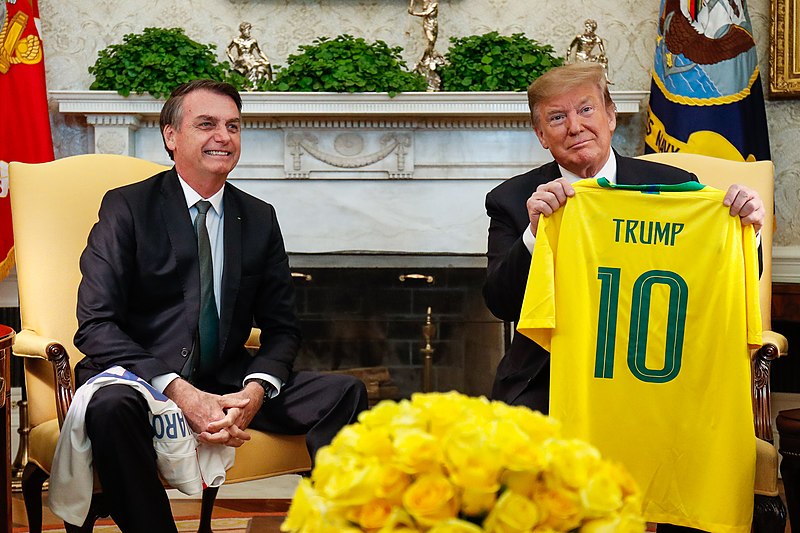The indignant “How dare you?” with which Greta Thunberg addressed the international heads of state and government at the United Nations in September quickly achieved worldwide fame. The appropriateness of this reproach is open to debate.
After all, it trivialises all the previous achievements in international climate policy to date, such as the Kyoto Protocol and the Paris Climate Change Convention. However, with regard to the main blockers at this year’s world climate conference in Madrid, the reproach is more than appropriate.
How can international cooperation on climate protection take place if there is no longer any cooperation during the negotiations? This year’s COP was characterized less by cooperative coexistence than by unilateral blocking by individual member states.
And not just any individual states, but the great economic powers, behind which presidents like Donald Trump and Jair Bolsonaro stand.
Problematic Presidents
The United States, one of the three largest CO2 emitters worldwide, has withdrawn from the Paris Agreement under Trump. They will no longer participate in the COP as of next year and, according to observers, have blocked some decisions in Madrid as well.
This year, Bolsanaro cut the budget for climate protection by 95 per cent and, at the same time, more and more Brazilian rainforest is being cleared. Brazil’s contribution to this year’s COP in particular was that maximum demands rendered any agreement on international climate protection impossible.
Long, Long Debates…
Never before has a UN Climate Conference overrun as much as this year’s. Negotiations 40 hours longer than planned. Those 40 hours could have been better used on international market mechanisms for climate protection.
The Article 6 debate has been postponed for a second time, and it remains questionable whether the next COP, in Glasgow, will lead to a successful conclusion if negotiations are the same as this year’s. If one can even speak of negotiations, since at this year’s COP only national interests were, ultimately, the focus.
However, if individual countries cooperate with each other, industrialised countries can increase their climate protection ambitions and thus clearly achieve more overall.
Problems and Much Needed Solutions
The key to successful climate protection, economists agree, is a globally uniform CO2 price. And for this, cooperation and market mechanisms are required.
In Madrid (the conference was originally to be held in Brazil until Bolsanaro came to power, and then in Chile – until unrest broke out there), the foundations for global market mechanisms for climate protection were to be laid. This is precisely the point at which last year’s COP in Katowice broke up without success.
The Paris Agreement already provides for such mechanisms, only their structure remains unclear. Through a global market mechanism, the division of the world into developing and industrialized countries could be left behind: Both greenhouse gas emissions and the cost of avoiding them vary around the world.
Due to their higher energy demands, CO2 emissions are greater in the industrialized countries than in emerging and developing countries.
However, avoidance costs are much lower in the latter, because obsolete technologies can be replaced by more efficient alternatives for comparatively little money. In industrialized nations, on the other hand, modern systems must often be replaced by the most modern ones. It’s much more expensive.
For climate protection, it makes sense for countries with a lot of money and high avoidance costs to invest in countries with little money and low avoidance costs – without reducing their own efforts. International cooperation is therefore a good way to get the most climate protection out of every euro spent. Developing countries in particular, which are those most affected by climate change, must now receive financial support to develop low-emission technology.
However, the 197 participating countries have failed on the operating principle of such a market mechanism. Brazil’s demand to continue the use of old certificates from the era of the Kyoto Protocol blocked any room for negotiations.
The market would be flooded by these certificates and some states could have been able to buy their way out of climate protection obligations cheaply. This scenario was untenable for many ambitious countries, including Germany.
Therefore, it was preferable to make no decision. Even the goal of setting higher national commitments by 2030 would not be achieved among the member states.
Saudi Arabia and India, for example, rejected this because the industrialized countries of the “old world” should have first presented stricter climate targets. Even the major CO2 emitters themselves, like China and Russia, have made no commitments.
Future Developments
Thus, the big questions at the next COP in Glasgow will not just be the negotiations on Article 6 and on the national commitments. There will be the question of how to deal with blocking states in a multilateral structure.
How can international climate protection work if the Trumps and Bolsanaros of this world attempt to block it with all their might? Climate protection can only be achieved via joint negotiations and compromises as well as constructive cooperation between the members of the global community.
The longer that national interests are pushed, the later there will be compromises that effectively contribute to climate protection. In particular, the major industrialized nations, which are among the biggest CO2 emitters, must be held responsible in accordance with the polluter pays principle.
We have to prove today, rather than tomorrow, that we are truly serious about climate protection. Because CO2 doesn’t stop at borders. The world must not be left to climate change deniers and “rainforest harvesters”.
Continue exploring:
Estonia Could Be Climate Neutrality Trailblazer
Climate-Wise: Why Environment Is Not a Side Issue



